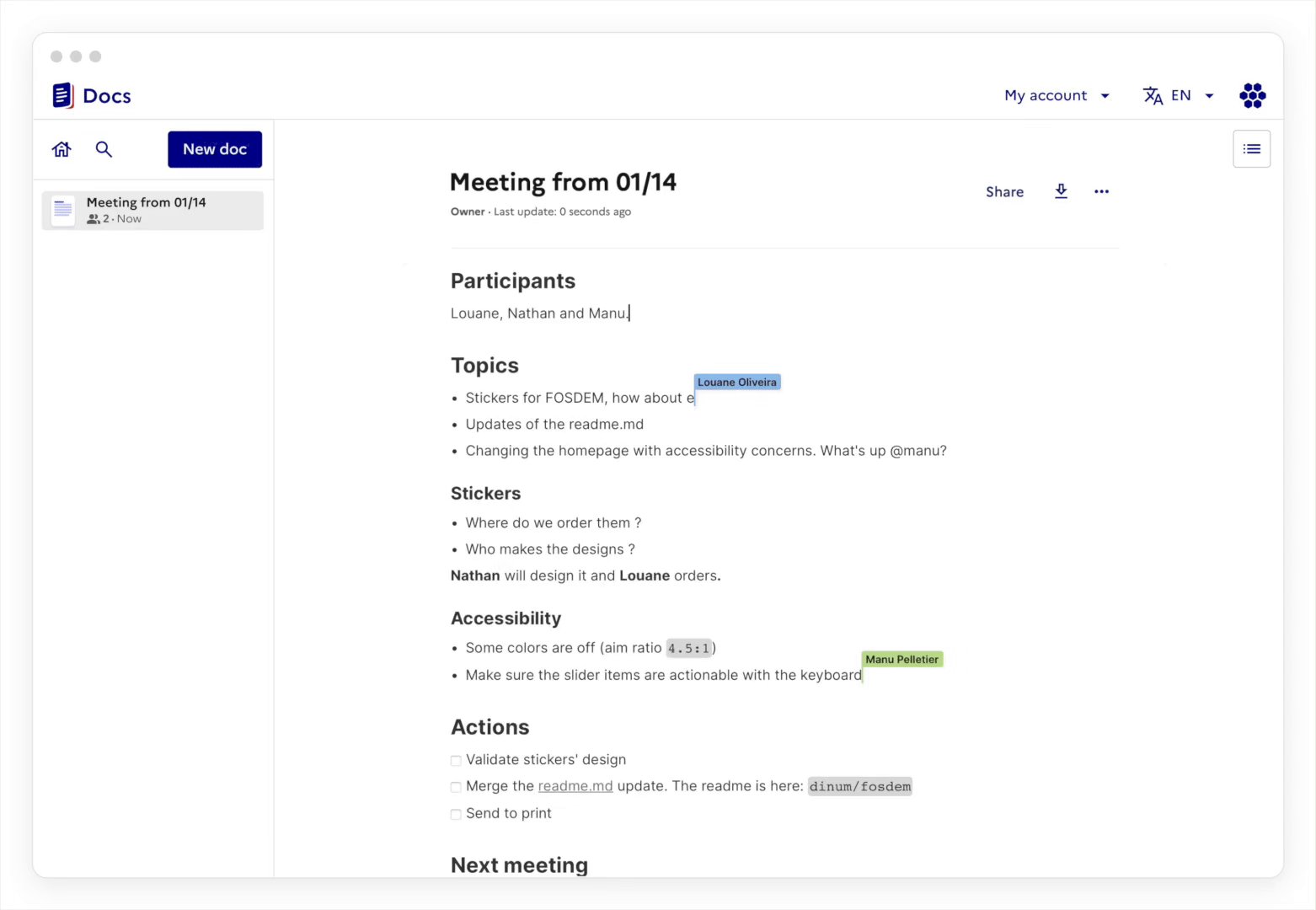In a digital world dominated by tech giants like Google, Microsoft, and Apple, sovereign and open-source alternatives are gaining ground. The latest European proposal in this vein is Docs, a collaborative document editor developed under the umbrella of La Suite Numérique, an initiative by the French government designed to offer public and self-hosted digital tools, particularly aimed at administrations.
But Docs is not just an alternative. It is a political and technological statement: to create, collaborate, and preserve knowledge without relying on private infrastructures or exposing sensitive data to external actors.
A tool designed for the public sector… and open to the rest of the world
Docs emerges from a Franco-German collaboration between DINUM (Direction interministérielle du numérique) of France and ZenDiS, its German counterpart. The goal: to build a modern, powerful, and sovereign editor, ideal for the public sector but available as free software for anyone who wants to implement it.
Among its standout features:
- Real-time collaborative editing.
- Modern, intuitive, and lightweight interface.
- Offline access with automatic synchronization upon reconnection.
- Version history, multi-format export, and advanced permissions.
- AI assistant for summarizing, correcting, or beautifying texts.
- Possibility of self-hosting on sovereign and secure infrastructures.
A modern and agile stack

Docs is built on cutting-edge technologies:
- Frontend in Next.js and BlockNote.js
- Backend using Django REST Framework
- Collaborative synchronization using Yjs
- Editing server via HocusPocus
This stack allows for an experience similar to Notion or Google Docs, but with the advantage of complete control over the environment: documents, servers, and data are under the control of the user or institution.
Integrated but ethical Artificial Intelligence
One of the most surprising features of Docs is its integration with a multilingual AI that allows for:
- Rephrasing text fragments.
- Summarizing documents.
- Beautifying or even “emojifying” content.
Unlike other platforms, this feature is designed to operate under the control of the instance and to respect user privacy guidelines. The goal is to assist, not to spy.
Digital sovereignty and regulatory compliance
Docs is not just about functionality. It is part of a larger strategy: to reclaim European digital sovereignty, especially in sensitive sectors such as education, justice, or public health.
Therefore, all services in La Suite Numérique—including Docs—are hosted on infrastructures certified by ANSSI (French National Agency for the Security of Information Systems) under the SecNumCloud standard, guaranteeing that:
- Data does not leave European territory.
- Compliance with GDPR requirements.
- Avoidance of reliance on US providers subject to extraterritorial legislation like the Cloud Act.
A real alternative for businesses, educational institutions, and communities
While designed with public administration in mind, Docs is perfectly usable by private organizations, NGOs, universities, or tech communities that value:
- Privacy.
- Control of the environment.
- The ability to customize or integrate with other systems (like LDAP or SSO via ProConnect).
- Technological independence.
Furthermore, the source code is available under the MIT license, allowing for commercial use, adaptation, and integration without restrictions, unlike other more restrictive free solutions.
Where to try or install it?
Additionally, the community is active on Matrix, and the development roadmap is public, with plans to enhance wiki integration, advanced export, and new interoperability functions.
Conclusion: an alternative worth attention
Docs not only represents a real and modern alternative to proprietary online editors, but asserts the right to work, collaborate, and manage documents without surveillance or technological dependency.
In a time when European governments advocate for strengthening their digital sovereignty, and companies increasingly seek independence from large monopolies, tools like Docs are a breath of fresh air in the free software ecosystem.
Whether for a public institution, a small business, or a group of users committed to controlling their data, Docs demonstrates that another way of working online is possible… and it is already available.
Discovered thanks to Itsfoss.

